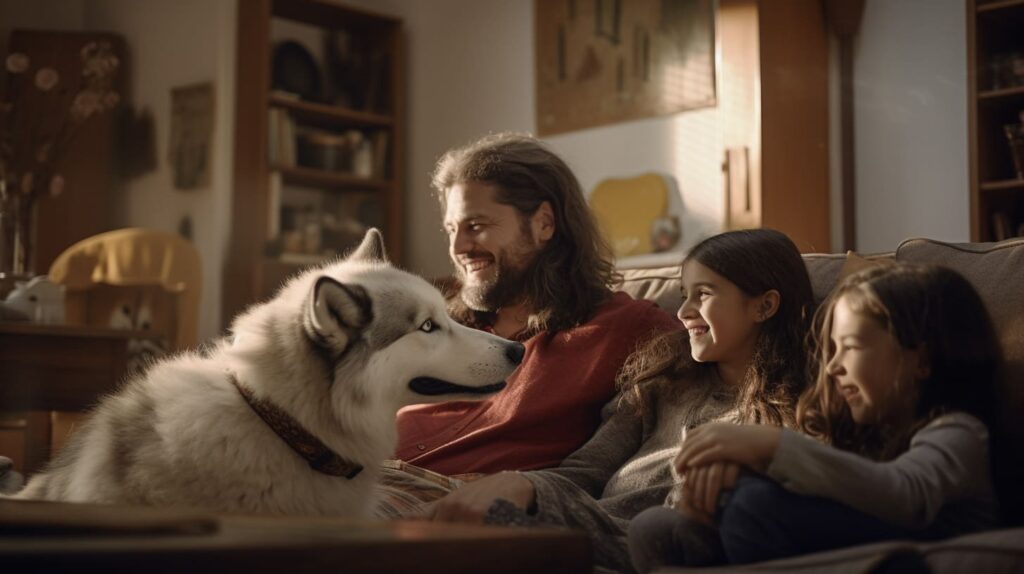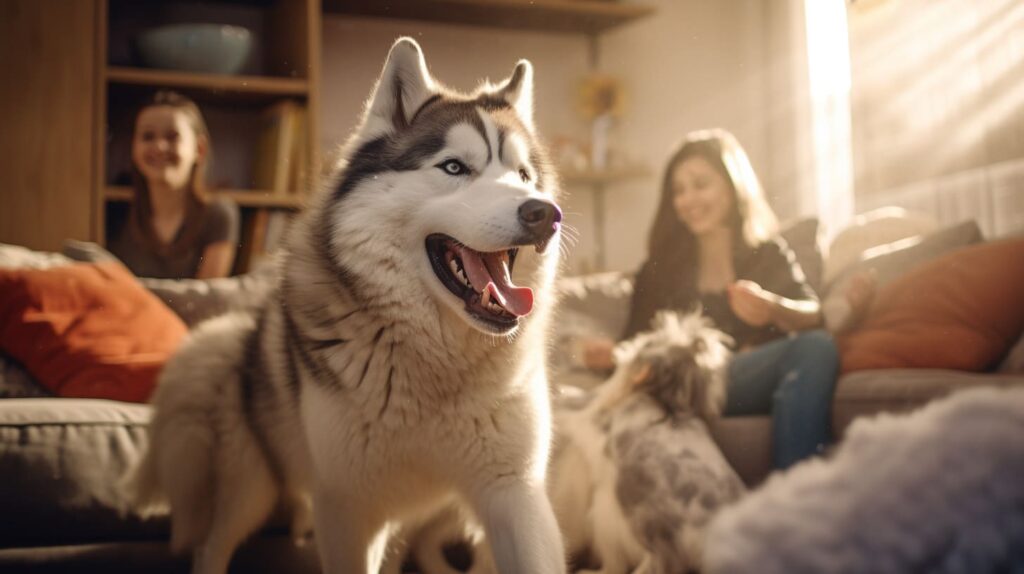Welcome to the world of Huskies, where every day is an adventure and a test of wills! If you’re considering bringing a Siberian Husky into your life, especially as a first-time dog owner, you’re in for a journey filled with learning, laughter, and much fur. Let’s dive into whether these majestic creatures fit those new to the dog-owning arena, and attempt to answer the question: are huskies good for first time owners?
Understanding the Siberian Husky
The Siberian Husky, with its striking appearance and vibrant personality, has captured the hearts of many. Known for their wolf-like looks and piercing blue eyes (or sometimes one blue and one brown – talk about a conversation starter!), Huskies are not just pretty faces. They’re a bundle of energy, intelligence, and independence.
Table of Contents
Are Huskies a Good Match for First-Time Owners?
The big question is, are these energetic and often headstrong beauties the right choice for someone who’s never owned a dog before? To answer this, we need to explore the unique traits of the Husky breed and what it truly takes to be a Husky parent. Buckle up, future Husky owners. We’re about to embark on a thrilling and enlightening ride!
Understanding the Husky Personality
The Energetic Nature of Huskies
Huskies are known for their high energy levels. Originally bred to pull sleds over long distances, they possess an innate stamina and a need for regular, vigorous exercise. This can be a challenge for first-time owners who may need more preparation for the commitment required to satisfy a Husky physically.
Intelligence and Independence
These dogs are not just sturdy; they’re brainy too. Huskies are highly intelligent, but they also have a streak of independence. While they can learn commands quickly, their independent nature might make them seem stubborn or uninterested in pleasing their owners, which can be a hurdle in training.
Strong-Willed and Playful
Huskies are often described as strong-willed. They have their own ideas about what’s fun and what’s not, and they’re not shy about expressing their opinions. This trait, combined with their playful and mischievous demeanor, means they need consistent and firm, yet gentle, training from an early age.
Affectionate and Sociable
Despite their challenges, Huskies are incredibly affectionate and friendly dogs. They form strong bonds with their owners and often behave friendly towards humans and other dogs. However, their sociability also means they don’t like being left alone for long periods, which is something potential owners should consider.
The Challenges of Husky Ownership
Owning a Husky can be a rewarding experience, but it’s important to be aware of the challenges that come with this unique breed, especially for first-time dog owners. Here, we delve into some of the key aspects that can make Huskies a demanding choice.
High Energy Levels and Exercise Needs
- Intense Activity Requirement: Huskies are known for their boundless energy. They were originally bred for pulling sleds over long distances, which means they require a significant amount of daily exercise to stay happy and healthy.
- Exercise Ideas: Regular, vigorous activities like running, hiking, or even dog sports are essential. Without adequate exercise, Huskies may develop behavioral issues due to pent-up energy.
Training and Stubbornness
- Training Challenges: While Huskies are intelligent, they can also be quite independent and stubborn. This can make training a challenge, particularly for first-time owners who may not be familiar with effective dog training techniques.
- Consistency is Key: Consistent, positive reinforcement methods work best. Early obedience training and socialization are crucial to managing their independent nature.
Strong Prey Drive and Escape Artist Tendencies
- Chasing Instincts: Huskies have a strong prey drive. Small animals can trigger their chase instinct, making off-leash time risky in unsecured areas.
- Houdini-like Escapes: Known for their escape skills, Huskies can easily become escape artists if left in an inadequately secured yard. High fences with no room for digging underneath are necessary.
Need for Constant Mental Stimulation
- Intellectual Needs: Huskies are not just physically active; they also need mental stimulation. Without it, they can become bored and destructive.
- Engaging Activities: Interactive toys, puzzle games, and regular training sessions can help keep their minds active and prevent negative behaviors.
The Joys of Owning a Husky
Huskies aren’t just about challenges; they bring a sled-load of joy and unique quirks that can make every day an adventure. Let’s dive into what makes these fluffy companions so special.

Loyal and Affectionate Nature
- Companionship at its Best
- Huskies are known for their deep loyalty and affectionate nature. They often form strong bonds with their owners, making them excellent companions.
- Family-Friendly Fluff Balls
- With proper training and socialization, Huskies can be great with children and other family members, often becoming protective and loving members of the family.
Playfulness and Unique Personality
- Never a Dull Moment
- Their playful nature ensures there’s never a dull moment. Huskies are known for their mischievous and energetic personality, which can bring laughter and fun to your household.
- Quirky Behaviors
- Each Husky has its own set of quirks – whether it’s a unique howl, a funny habit, or a particular way they interact with their toys or family members.
Stunning Beauty and Appeal
- Aesthetic Charm
- Huskies are renowned for their striking appearance, with their thick fur coats, piercing eyes, and graceful posture.
- Photogenic Furry Friends
- Their photogenic qualities make them a hit on social walks and in family photos, adding an extra layer of joy to owning this beautiful breed.
Huskies are more than just pets; they’re heartwarming companions that bring a unique blend of joy, loyalty, and entertainment to any home. While they do come with certain challenges, the love and laughter they provide can make every effort worth it for the right owner.
ChatGPT
Certainly! Here’s an expanded version of Section 5, providing in-depth information for potential first-time Husky owners:
Preparation and Responsibilities
Welcoming a Husky into your home as a first-time dog owner is not just about the excitement and joy; it’s a significant commitment that requires careful preparation and understanding of responsibilities. Let’s dive into what you need to know and do to ensure you’re ready for your new furry companion.
Understanding Dog Care Basics
Healthcare Essentials
Huskies are generally healthy, but like all breeds, they have specific health needs. Regular veterinary check-ups are a must to keep them in tip-top shape. Ensure they receive all necessary vaccinations and preventive treatments for fleas, ticks, and worms. Huskies can be prone to certain genetic issues like hip dysplasia and eye problems, so regular health screenings are important.
Nutrition
Feeding your Husky a balanced diet is crucial. Huskies, known for their efficient metabolism, often eat less than other breeds of their size. However, their diet needs to be high-quality and nutritious to support their energy levels. Discuss with your vet the best dietary plan, considering factors like age, weight, and activity level. Be mindful of overfeeding, as Huskies can become overweight if their food intake isn’t properly managed.
Grooming
Huskies boast a beautiful double coat that requires regular grooming. They shed heavily twice a year, during which daily brushing helps manage the fur avalanche. Even outside these shedding seasons, brush your Husky at least weekly to keep their coat healthy and reduce loose hair. Regular baths, nail trims, and dental care are also essential to keep your Husky clean and healthy.
Time Commitment for Training and Exercise
Consistent Training
Training a Husky can be a challenge due to their intelligent yet independent nature. Start training early, focusing on basic commands and house rules. Positive reinforcement techniques work best. Be patient and consistent; inconsistency can lead to behavioral issues. Huskies respond well to training that’s fun and engaging, so keep sessions short and sweet to maintain their interest.
Daily Exercise
Huskies are high-energy dogs originally bred for pulling sleds over long distances. They require a lot of exercise — typically at least an hour a day. This can include walks, runs, hikes, and playtime. Lack of sufficient exercise can lead to pent-up energy and result in destructive behavior. If you’re an active person, a Husky might be a great fit, but if not, you might need to adjust your lifestyle.
Engagement
Huskies thrive on attention and engagement. They’re social creatures and love being part of family activities. Ensure you have enough time to spend with your Husky, engaging in activities beyond just exercise. Lack of attention can lead to anxiety and behavioral issues in these pack-oriented dogs.
Financial Considerations
Initial Costs
The initial cost of acquiring a Husky can vary, whether you’re adopting from a shelter or purchasing from a breeder. Remember, the initial cost is just the beginning. You’ll also need to invest in supplies like a collar, leash, crate, bed, toys, and food bowls.
Ongoing Expenses
Budget for ongoing expenses such as high-quality dog food, grooming supplies, routine veterinary care, and pet insurance. Also, consider the cost of obedience classes or professional training, especially if you’re a first-time dog owner.
Emergency Fund
Unexpected health issues can arise, and veterinary care can be expensive. Having an emergency fund or considering pet insurance to cover unforeseen medical expenses is wise. This financial cushion can be a lifesaver in managing emergency health issues without added stress.
Training and Socialization for Huskies
Ensuring your Husky is well-trained and properly socialized is crucial, especially for first-time dog owners. This section dives into the essentials of training and socializing your Husky, setting the stage for a well-behaved, happy companion.
The Importance of Early and Consistent Training
Starting Early
Huskies are intelligent and learn quickly, but they also have a streak of independence. Starting training early is key. As puppies, they’re more receptive to learning new commands and understanding their place in your home. Basic commands like ‘sit’, ‘stay’, ‘come’, and ‘heel’ lay the foundation for further training.
Consistency is Key
Consistency in training is crucial with Huskies. They respond best to routines and clear expectations. Be consistent with commands, rewards, and boundaries. Inconsistent training can lead to confusion and behavioral issues. Make sure all family members are on the same page with training techniques and rules.
Socialization Needs and Tips for Huskies
Why Socialization Matters
Socialization is about more than just playing with other dogs. It’s about exposing your Husky to various people, animals, environments, and experiences. Proper socialization reduces fear and anxiety and fosters confidence.
Socialization Tips
- Start Early: Begin socializing your Husky as soon as they’re vaccinated.
- Variety of Experiences: Expose them to different sounds, sights, and smells in a controlled manner.
- Positive Encounters: Ensure all socialization experiences are positive. Use treats and praise to associate new experiences with rewards.
- Puppy Classes: Consider enrolling in puppy classes, where your Husky can learn to interact with other dogs and people in a safe, structured environment.
Resources for Training
Training Classes
Many pet stores and community centers offer training classes. These are great for learning basic obedience and for socialization with other dogs and people. Look for classes that use positive reinforcement methods.
Online Resources
There are numerous online resources available, including:
- AKC’s Training Resources: Offers a wealth of information on training dogs of all breeds.
- YouTube Channels: Channels like Zak George’s Dog Training Revolution provide free, high-quality training videos.
Books
- The Art of Raising a Puppy by The Monks of New Skete: A great resource on puppy training and development.
- 101 Dog Tricks by Kyra Sundance: Perfect for keeping your Husky mentally stimulated through learning new tricks.
Alternatives to Huskies for First-Time Owners
While Huskies are magnificent creatures, they might not be the best fit for every first-time dog owner. Let’s explore some other dog breeds that are often recommended for novices, including the pros and cons of each.
Labrador Retriever
Pros
- Friendly and Outgoing: Labradors are known for their friendly and sociable nature, making them great family pets.
- Trainable: They are highly trainable and often excel in obedience, which can be a big plus for first-time owners.
- Good with Children: Labradors are generally very good with children and other pets.
Cons
- High Energy Levels: They require a lot of exercises, similar to Huskies.
- Shedding: Like Huskies, Labradors shed quite a bit, especially during seasonal changes.
Golden Retriever
Pros
- Gentle and Patient: Golden Retrievers are well-known for their gentle and patient demeanor.
- Eager to Please: This breed is eager to please its owners, which makes training more straightforward.
- Great Companions: They are loyal and affectionate, making them excellent companions.
Cons
- Grooming Needs: Their long coat requires regular grooming to prevent matting.
- Health Issues: They can be prone to certain health issues like hip dysplasia and heart problems.
Cavalier King Charles Spaniel
Pros
- Adaptable: Cavaliers adapt well to various living situations, including apartments.
- Friendly and Affectionate: They are known for their friendly and affectionate nature.
- Lower Exercise Needs: Compared to Huskies, they have lower exercise needs, suitable for less active owners.
Cons
- Grooming: Their long fur requires regular grooming.
- Separation Anxiety: They can be prone to separation anxiety if left alone for long periods.
Beagle
Pros
- Size: Beagles are smaller than Huskies, which can be more manageable for first-time owners.
- Friendly Nature: Beagles are known for their friendly and curious nature.
- Moderate Exercise Needs: They need regular exercise but not as much as a Husky.
Cons
- Stubbornness: Beagles can be stubborn, which might challenge training.
- Vocal: They tend to be more vocal, which can be a consideration for those in apartments or shared living spaces.
Each of these breeds has unique characteristics and might be a more suitable option for first-time dog owners. Consider your lifestyle, living situation, and the qualities you’re looking for in a dog before deciding. Remember, every dog is an individual, and breed traits can vary, so spending time with a dog before bringing them home is always beneficial. 🐕🏠💖
Conclusion
As we reach the end of our Husky exploration journey, let’s recap the key points about these magnificent dogs and their suitability for first-time owners.
Summarizing the Siberian Husky
Unique Temperament and Needs
Huskies are known for their intelligence, energy, and independent nature. These traits make them both exciting and challenging pets. They require consistent training, ample exercise, and regular mental stimulation to thrive.
Time and Commitment
Owning a Husky is a substantial time commitment. Their exercise needs and grooming requirements demand daily attention. Training, while rewarding, also requires patience and consistency, especially for first-time owners.
Joy and Companionship
Despite the challenges, Huskies offer unmatched companionship and loyalty. Their playful demeanor and affectionate nature make them wonderful pets for those who can meet their needs.
Making an Informed Decision
Research is Key
Before deciding to bring a Husky into your home, do thorough research. Understand the breed’s needs and assess whether they align with your lifestyle. Consider factors like living space, availability of time for training and exercise, and readiness for a long-term commitment.
Consider Your Experience
As first-time dog owners, it’s important to evaluate whether a high-energy and independent breed like the Husky is the right choice. If you’re unsure, seek advice from current Husky owners, breeders, or veterinarians.
Evaluate Your Lifestyle
Reflect on your current lifestyle. Are you able to provide the exercise, attention, and care a Husky requires? Be honest with yourself about the level of commitment you can offer.
Owning a Husky can be one of the most rewarding experiences, filled with joy, laughter, and adventure. However, it’s a decision that should be made with careful thought and consideration, especially for those new to the world of dog ownership. Take your time, do your homework, and if you decide to go ahead, get ready for an incredible journey with your new furry friend. 🐾💙🏡
Additional Resources
Embarking on the journey of Husky ownership, especially as a first-time dog owner, is exciting and challenging. To help you along, we’ve compiled a list of additional resources. These will provide you with further insights, tips, and community support.
Husky-Specific Websites and Forums
Siberian Husky Club of America
- Offers a wealth of information specific to Siberian Huskies, including health, training, and rescue information.
My Husky
- A forum where Husky owners share experiences and advice. Great for getting real-life tips and connecting with other Husky enthusiasts.
Online Training Resources
Doggy Dan’s Online Dog Trainer
- Features comprehensive video training courses suitable for breeds like Huskies. Focuses on positive reinforcement techniques.
K9 of Mine
- Offers training advice, product reviews, and care tips that can be especially helpful for first-time Husky owners.
Books on Husky Care and Training
The Siberian Husky – A Complete Guide to Raising, Training, and Caring for Your Husky
- Provides in-depth insights into the breed’s specific needs and characteristics.
The Happy Puppy Handbook: Your Definitive Guide to Puppy Care and Early Training
- While not Husky-specific, this book is a great resource on early puppy care and training methods.
Social Media Groups and YouTube Channels
Husky Owners Group on Facebook
- A community where you can share stories, ask questions, and get advice from fellow Husky owners.
Gone to the Snow Dogs
- A YouTube channel featuring Huskies. It covers everything from daily care to adventures with Huskies.
Local Husky Clubs and Rescue Groups
Find a local Husky club
- Connect with local Husky clubs for support, advice, and community events. Check the Siberian Husky Club of America for listings.
Rescue and Adoption
- Consider adopting a Husky. Rescue organizations like Siberian Husky Rescue can be a great place to start.






